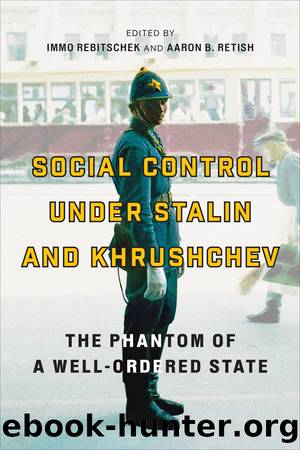Social Control under Stalin and Khrushchev by Immo Rebitschek & Aaron B. Retish

Author:Immo Rebitschek & Aaron B. Retish
Language: eng
Format: epub
Tags: Stalin, Joseph, 1878–1953 – Influence, Khrushchev, Nikita Sergeevich, 1894–1971 – Influence, Social control – Soviet Union – History, Social norms – Soviet Union – History, Police – Soviet Union – History, Criminal law – Soviet Union – History, Punishment – Soviet Union – History, Soviet Union – Social policy
Publisher: University of Toronto Press
Published: 2023-02-15T00:00:00+00:00
Conclusion
The language of convicted thieves found in the above sample of petitions for clemency offers insights into how Stalinist decrees intended to protect socialist property represented a significant departure from the earlier legal environment. Almost overnight, traditional practices were severely punished as socialist property laws outlawed behaviours that were previously considered to be based on natural laws governing trade and nutrition. Defining property as under socialist ownership, combined with an increasing commodification of everyday objects, radically overturned the long-standing socio-economic and legal role of property. These extraordinary changes affected every social class, forcing a new class of âthievesâ to invent a new tradition by affirming allegiance to the new society in their petitions and testimonies, even though they acted in ways that the state no longer deemed acceptable.63 This dramatic change in the legal environment had significant implications for the ways in which the people thought about and managed commodities, ultimately transforming their relationships with the Soviet state as a protective and even paternalist authority and shaping their perception of shared social norms and values.
To defend themselves, convicted thieves invented a new discourse in which they promoted their roles in society, even when they did not follow, recognize, or even grasp its rules establishing an extreme degree of protection to socialist property. Their partial understandings occasionally led them to express themselves awkwardly about this conception of property and its precise contours and contents.
My initial assumptions were that the new Stalin-era legal environment governing socialist property upended established beliefs and practices. The justifications offered by convicted thieves who requested pardons in effect offer alternative insights into the functioning of the legal system, while also illustrating a strange relationship to equity and justice that could only sound familiar to an early modern historian accustomed to this type of source. In defending themselves, few of these thieves questioned the law itself, with the majority merely claiming that the rules did not apply to their particular case.
The profession of historian sometimes requires us to retrieve sad stories from the archives and stories about oblivion and resuscitate anti-heroes and infamous criminals who suffered dreadful punishments at the hands of the State. I have attempted here to allow these Stalin-era thieves to speak once again, even though they left few traces beyond their awkward appeals for pardon. Their collective and individual ability to cope with revolutionary times and with the trauma of war should be understood in light of the right of Soviet citizens to be protected and understood by the State. Their letters define the terms of a social pact with the powerful Soviet State. In coping with new official policy grounded in the Stalinist Stateâs drive to accumulate capital to fuel industrial and military development that somehow became embodied by socialist property, they were proclaiming their rights to a share of this wealth based on their commitments and skills and their status as loyal citizens. By labelling them as criminals and thieves, the Stalin regime dramatically altered the terms of the social agreement and alienated vast swathes of Soviet society.
Download
This site does not store any files on its server. We only index and link to content provided by other sites. Please contact the content providers to delete copyright contents if any and email us, we'll remove relevant links or contents immediately.
What's Done in Darkness by Kayla Perrin(26592)
The Fifty Shades Trilogy & Grey by E L James(19079)
Shot Through the Heart: DI Grace Fisher 2 by Isabelle Grey(19058)
Shot Through the Heart by Mercy Celeste(18936)
Wolf & Parchment: New Theory Spice & Wolf, Vol. 10 by Isuna Hasekura and Jyuu Ayakura(17112)
Python GUI Applications using PyQt5 : The hands-on guide to build apps with Python by Verdugo Leire(16991)
Peren F. Statistics for Business and Economics...Essential Formulas 3ed 2025 by Unknown(16878)
Wolf & Parchment: New Theory Spice & Wolf, Vol. 03 by Isuna Hasekura and Jyuu Ayakura & Jyuu Ayakura(16825)
Wolf & Parchment: New Theory Spice & Wolf, Vol. 01 by Isuna Hasekura and Jyuu Ayakura & Jyuu Ayakura(16447)
The Subtle Art of Not Giving a F*ck by Mark Manson(14353)
The 3rd Cycle of the Betrayed Series Collection: Extremely Controversial Historical Thrillers (Betrayed Series Boxed set) by McCray Carolyn(14134)
Stepbrother Stories 2 - 21 Taboo Story Collection (Brother Sister Stepbrother Stepsister Taboo Pseudo Incest Family Virgin Creampie Pregnant Forced Pregnancy Breeding) by Roxi Harding(13640)
Scorched Earth by Nick Kyme(12771)
Drei Generationen auf dem Jakobsweg by Stein Pia(10965)
Suna by Ziefle Pia(10888)
Scythe by Neal Shusterman(10337)
International Relations from the Global South; Worlds of Difference; First Edition by Arlene B. Tickner & Karen Smith(9522)
The Ultimate Python Exercise Book: 700 Practical Exercises for Beginners with Quiz Questions by Copy(9448)
D:\Jan\FTP\HOL\Work\Alien Breed - Tower Assault CD32 Alien Breed II - The Horror Continues Manual 1.jpg by PDFCreator(9428)
